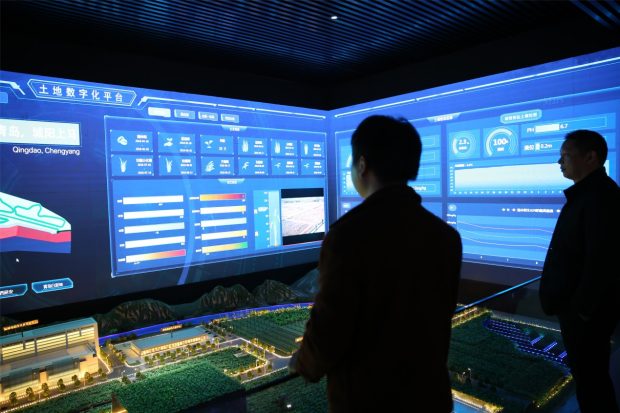Chinese technology companies push for smart farming

The smart agriculture system developed by Huawei integrating sensors, Internet of Things, cloud computing and big data
Chinese companies are applying their technologies into farming in a bid to increase agricultural production and efficiency, realize industry upgrades and reduce costs, Chinanews.com reported on Feb. 28. These efforts, dubbed as smart agriculture, uses mobile devices or computers to control agricultural production. It also includes agricultural e-commerce, anti-counterfeiting traceability of food, agricultural leisure tourism, and agricultural information services.
Lei Zongxiong, who has worked for Alibaba Cloud, for over four years, took part in Alibaba’s AI pig farming program in 2018. Through facial recognition, the AI could assist farmers to know about and manage pigs’ health conditions. Lei said the massive application of AI into the industry is pioneering worldwide. Now his team has created seven algorithms for many pig farms raising more than 1,000 pigs throughout the country. Tencent, a major rival of Alibaba, applies technologies into cultivating cucumbers in greenhouses. Luo Dijun, a researcher with Tencent Al Lab, said the aim of smart agriculture is to improve agricultural production efficiency.
Huawei, JD.com, and Baidu have also devoted efforts into smart agriculture. With more efforts and resources devoted into this field, the potential value of China’s smart agriculture is expected to grow to $26.8 billion in 2020 from $13.7 billion in 2015, according to market research company ASKCI Consulting Co, Ltd. Fu Yao, a researcher with a fund management company, said the accession of technology giants into the agriculture industry is good news, because they have technological advantages, and could provide funds for small companies with big potentials. Industry insiders said due to less advanced agricultural facilities, and the low acceptance of smart agriculture in the rural areas, the development of smart industry is still at a primary stage. In addition, challenges in need of tackling include the fact that technology companies lack farming experience and the fact that agricultural enterprises have an insufficient understanding regarding information technology.
(People’s Daily Online)





















































